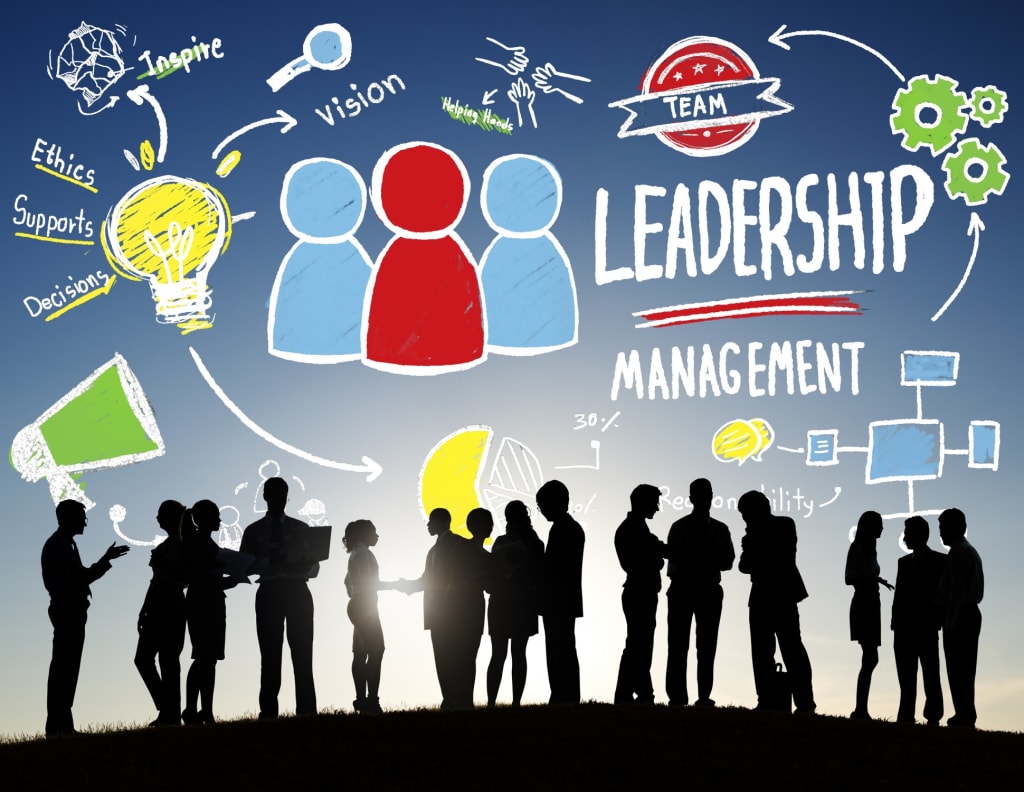Leadership and management
Comprehensive Guide

Introduction:
Leadership and management development is a vital process for individuals seeking to enhance their skills and effectiveness in leading teams, managing projects, and driving organizational success. This comprehensive guide is designed to provide a roadmap for developing key leadership and management competencies, regardless of industry or sector. By following this guide, aspiring and current leaders can develop the necessary skills to navigate complex challenges, inspire their teams, and achieve exceptional results.
Table of guide:
Understanding Leadership and Management:
1.1 Differentiating between leadership and management.
1.2 Importance of leadership and management in organizations
1.3 Core competencies of effective leaders and managers
Assessing Your Leadership and Management Style:
2.1 Identifying your current leadership and management style.
2.2 Conducting a self-assessment of strengths and areas for development.
2.3 Seeking feedback from peers, superiors, and subordinates.
Developing Leadership and Management Competencies:
3.1 Emotional intelligence and self-awareness
3.2 Effective communication and active listening
3.3 Decision-making and problem-solving
3.4 Building and leading high-performing teams
3.5 Strategic thinking and visioning
3.6 Change management and adaptability
3.7 Conflict resolution and negotiation skills
3.8 Coaching and mentoring
Creating a Personal Development Plan:
4.1 Setting clear goals and objectives.
4.2 Identifying development opportunities.
4.3 Creating an action plan with measurable steps.
4.4 Leveraging resources and support systems.
Learning Methods and Resources:
5.1 Formal education and training programs
5.2 Professional development workshops and seminars
5.3 Industry conferences and networking events
5.4 Online courses and e-learning platforms
5.5 Books, articles, and research papers
5.6 Mentoring and coaching relationships
5.7 Participating in leadership and management communities.
Applying Leadership and Management Skills:
6.1 Applying newly acquired skills in real-life scenarios.
6.2 Taking on leadership roles and responsibilities.
6.3 Seeking opportunities for professional growth and advancement.
6.4 Learning from setbacks and failures
6.5 Continuous learning and improvement
Overcoming Challenges and Roadblocks:
7.1 Dealing with resistance to change.
7.2 Managing difficult conversations and conflicts.
7.3 Balancing leadership and management responsibilities
7.4 Maintaining motivation and resilience.
7.5 Seeking support from mentors and colleagues.
Sustaining Leadership and Management Excellence:
8.1 Practicing self-reflection and continuous improvement
8.2 Staying updated with industry trends and best practices.
8.3 Fostering a culture of leadership development in your organization.
8.4 Paying it forward by mentoring and developing future leaders.
Cultivating Effective Leadership and Management Behaviors:
9.1 Leading by example and practicing ethical behavior.
9.2 Empowering and delegating responsibilities to team members
9.3 Promoting a culture of trust, collaboration, and inclusivity.
9.4 Recognizing and celebrating achievements and milestones.
9.5 Demonstrating resilience and adaptability in the face of challenges.
9.6 Balancing assertiveness with empathy and compassion
Leveraging Technology for Leadership and Management Development:
10.1 Utilizing digital tools and platforms for remote collaboration.
10.2 Harnessing data analytics for informed decision-making
10.3 Adopting project management and productivity software.
10.4 Engaging in online leadership and management communities and forums.
10.5 Embracing continuous learning through webinars and virtual conferences.
Leading and Managing Multigenerational Teams:
11.1 Understanding generational differences and values.
11.2 Leveraging the strengths of each generation.
11.3 Building bridges and fostering collaboration across generations.
11.4 Creating an inclusive work environment for all generations.
11.5 Addressing and resolving conflicts arising from generational differences.
Developing Cross-Cultural Leadership and Management Skills:
12.1 Cultivating cultural intelligence and global mindset.
12.2 Adapting leadership styles to diverse cultural contexts
12.3 Building awareness of cultural nuances and communication styles
12.4 Respecting and valuing diversity in the workplace
12.5 Navigating cultural challenges and promoting cultural synergy.
Leading and Managing Virtual Teams:
13.1 Establishing clear communication channels and expectations.
13.2 Promoting virtual team collaboration and engagement.
13.3 Leveraging virtual meeting and project management tools.
13.4 Building trust and rapport in virtual settings
13.5 Addressing virtual team challenges and mitigating conflicts.
Balancing Work-Life Integration:
14.1 Prioritizing self-care and maintaining physical and mental well-being.
14.2 Setting boundaries and managing time effectively.
14.3 Fostering work-life balance within your team.
14.4 Encouraging a supportive and flexible work environment.
14.5 Modeling work-life integration as a leader
Evaluating Leadership and Management Development Progress:
15.1 Conducting regular self-assessments and reflections.
15.2 Seeking feedback from stakeholders and team members.
15.3 Measuring the impact of leadership and management development initiatives.
15.4 Adjusting goals and development plans based on feedback and results.
15.5 Celebrating achievements and milestones along the journey.
Embracing Ethical Leadership and Corporate Social Responsibility:
16.1 Leading with integrity, transparency, and accountability.
16.2 Considering the ethical implications of decision-making.
16.3 Promoting a culture of corporate social responsibility.
16.4 Engaging in sustainable practices and initiatives.
16.5 Balancing organizational success with societal impact.
Conclusion:
With the guidance provided in this comprehensive leadership and management development guide, individuals can embark on a transformative journey to become effective leaders who inspire, motivate, and empower their teams. By continuously honing their skills, embracing new perspectives, and adapting to changing circumstances, leaders and managers can drive organizational growth, foster innovation, and make a positive impact in their professional and personal lives. Remember
About the Creator
Frank Odhiambo
Frank Odhiambo is a seasoned and passionate writer renowned for his compelling and thought-provoking pieces. Global award winner for "Voice of reason" He has established himself as a prominent voice in the world of authors and writers.
Enjoyed the story? Support the Creator.
Subscribe for free to receive all their stories in your feed. You could also pledge your support or give them a one-off tip, letting them know you appreciate their work.






Comments
There are no comments for this story
Be the first to respond and start the conversation.